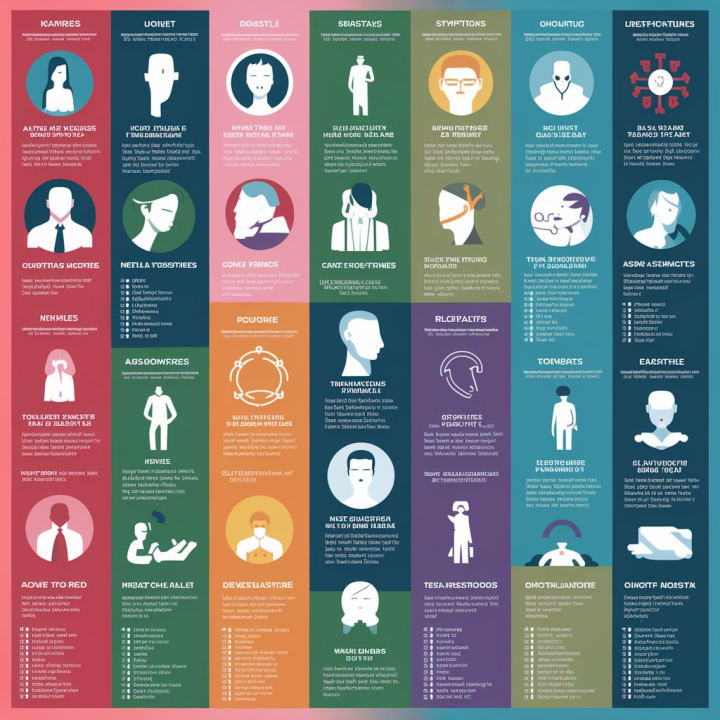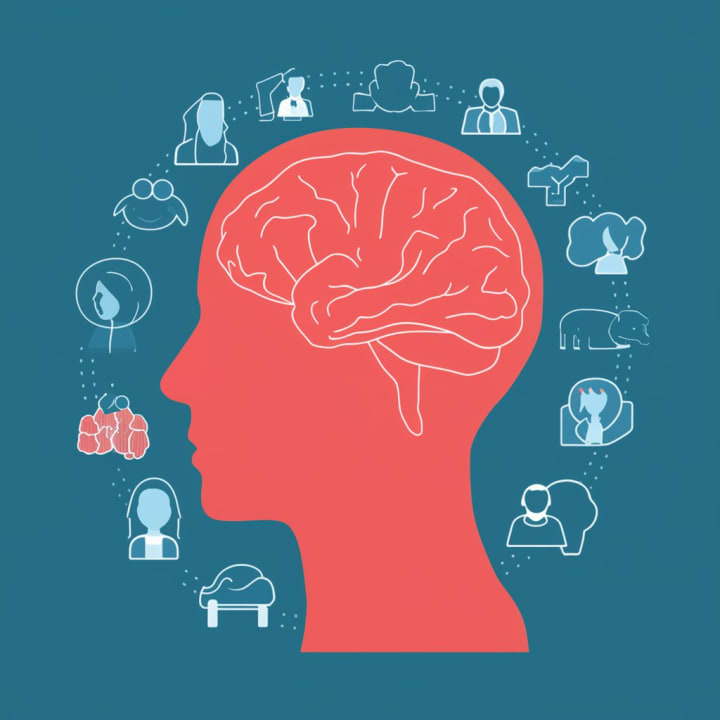Comprehensive Guide to Mental Health Conditions: Understanding, Diagnosing, and Treatment Approaches
An In-Depth Resource on Mental Health: Insights into Identification, Diagnosis, and Effective Treatments

Introduction
Mental health conditions affect millions of people worldwide, impacting their quality of life and overall well-being. Understanding, diagnosing, and treating mental health conditions is crucial in promoting mental health and helping individuals lead fulfilling lives. This comprehensive guide will delve into the various aspects of mental health conditions, including understanding different types of disorders, recognizing symptoms, diagnosing mental health issues, and exploring various treatment approaches. By the end of this guide, you'll have a clearer picture of the complexities surrounding mental health and the importance of proper diagnosis and treatment.
Comprehensive Guide to Mental Health Conditions: Understanding, Diagnosing, and Treatment Approaches.
Comprehensive Guide to Mental Health Conditions: Understanding
Overview of Mental Health Conditions
Mental health conditions encompass a wide range of disorders that affect mood, thinking, and behavior. These conditions can be temporary or chronic, mild or severe, and can significantly impact an individual's ability to function in daily life. Some of the most common types of mental health disorders include anxiety disorders, depression, bipolar disorder, schizophrenia, and eating disorders. Each of these conditions has unique characteristics and requires different approaches to management and treatment.
Types of Mental Health Disorders
1. Anxiety Disorders: Characterized by excessive fear or anxiety, these disorders include generalized anxiety disorder, panic disorder, social anxiety disorder, and specific phobias. Symptoms often include restlessness, rapid heartbeat, and difficulty concentrating.
2. Depression: This mood disorder causes persistent feelings of sadness, hopelessness, and loss of interest in activities once enjoyed. Depression can also manifest as physical symptoms such as fatigue and changes in appetite.
3. Bipolar Disorder: Marked by extreme mood swings, bipolar disorder includes episodes of mania (high energy, euphoria) and depression. These mood changes can be disruptive and impair daily functioning.
4. Schizophrenia: A severe mental health condition that affects a person's ability to think, manage emotions, and interact with others. Symptoms include hallucinations, delusions, and disorganized thinking.
5. Eating Disorders: Conditions such as anorexia nervosa, bulimia nervosa, and binge-eating disorder involve unhealthy relationships with food and body image. These disorders can lead to serious physical health problems.
Signs and Symptoms of Mental Health Problems

Recognizing the signs and symptoms of mental health problems is the first step toward seeking help. Symptoms can vary widely depending on the specific condition but may include:
Emotional Symptoms: Persistent sadness, excessive fears, mood swings, and feelings of hopelessness or worthlessness.
Behavioral Symptoms: Withdrawal from social activities, changes in eating or sleeping patterns, substance abuse, and noticeable changes in behavior or personality.
Physical Symptoms: Unexplained physical ailments, fatigue, changes in weight, and poor personal hygiene.
The Importance of Mental Health Awareness
Raising awareness about mental health conditions is vital for reducing stigma and encouraging individuals to seek help. Mental health education can help people recognize the early signs of mental health problems and understand the importance of mental health support and treatment. By promoting open discussions and providing accurate information, we can create a more supportive environment for those affected by mental health issues.
Comprehensive Guide to Mental Health Conditions: Diagnosing.
Diagnosing Mental Health: The Process
Diagnosing mental health conditions involves a comprehensive evaluation by mental health professionals. The process typically includes a combination of self-reported symptoms, clinical observations, and standardized assessment tools. Mental health diagnosis is crucial for developing an effective treatment plan tailored to the individual's needs.
Mental Health Assessment and Psychological Evaluation
1. Mental Health Assessment: This initial evaluation often includes a detailed interview about the individual's symptoms, medical history, family history, and lifestyle factors. The assessment helps identify the presence and severity of mental health problems.
2. Psychological Evaluation: Psychological evaluations use standardized tests and questionnaires to assess various aspects of mental health, such as cognitive function, emotional state, and personality traits. These evaluations provide valuable insights into the nature of the mental health condition and guide the diagnostic process.
How to Diagnose Mental Illness: Key Steps
Diagnosing mental illness involves several key steps:
1. Clinical Interview: A thorough interview with the patient to gather information about symptoms, duration, and impact on daily life. This interview may also include discussions with family members or close friends to gain a comprehensive understanding of the individual's condition.
2. Physical Examination: A physical exam is conducted to rule out any medical conditions that may be contributing to the symptoms. This step ensures that the diagnosis focuses solely on mental health issues.
3. Psychological Testing: Standardized tests and questionnaires are administered to evaluate cognitive abilities, emotional health, and personality traits. These tests help identify specific mental health conditions and their severity.
4. Diagnostic Criteria: Mental health professionals use diagnostic criteria from the Diagnostic and Statistical Manual of Mental Disorders (DSM-5) or the International Classification of Diseases (ICD-11) to classify and diagnose mental health conditions accurately.
Challenges in Mental Health Diagnosis
Diagnosing mental health conditions can be challenging due to the complexity and variability of symptoms. Some challenges include:
Overlapping Symptoms: Many mental health conditions share similar symptoms, making it difficult to differentiate between disorders.
Subjective Reporting: The accuracy of the diagnosis depends on the individual's ability to describe their symptoms accurately.
Stigma: Fear of stigma may prevent individuals from seeking help or being honest about their symptoms.
The Role of Mental Health Professionals
Mental health professionals, including psychiatrists, psychologists, and licensed counselors, play a crucial role in diagnosing and treating mental health conditions. Their expertise and experience ensure accurate diagnoses and effective treatment plans. Mental health counseling and therapy are integral parts of the diagnostic and treatment process, providing support and guidance to individuals as they navigate their mental health journey.
Comprehensive Guide to Mental Health Conditions: Treatment Approaches

Mental Health Treatment: Overview
Effective treatment of mental health conditions requires a multi-faceted approach tailored to the individual's specific needs. Treatment plans often include a combination of medication, therapy, lifestyle changes, and support from mental health professionals. The goal is to alleviate symptoms, improve functioning, and enhance the overall quality of lifestyles through Mental Health Therapy and Counseling.
1. Cognitive Behavioral Therapy (CBT): CBT is a widely used therapeutic approach that helps individuals identify and change negative thought patterns and behaviors. It is effective in treating various conditions, including anxiety and depression.
2. Dialectical Behavior Therapy (DBT): DBT combines cognitive-behavioral techniques with mindfulness practices. It is particularly effective for individuals with borderline personality disorder and those struggling with emotional regulation.
3. Psychodynamic Therapy: This therapy focuses on exploring unconscious thoughts and feelings to gain insight into current behavior. It is beneficial for individuals with deep-seated emotional issues.
4. Humanistic Therapy: Humanistic therapy emphasizes personal growth and self-actualization. It encourages individuals to explore their potential and develop a stronger sense of self.
5. Group Therapy: Group therapy involves multiple individuals with similar issues coming together under the guidance of a therapist. It provides a supportive environment and helps individuals realize they are not alone in their struggles.
Specific Treatments for Common Mental Health Disorders
1. Therapy for Anxiety: Anxiety disorders are commonly treated with CBT, which helps individuals manage and reduce anxiety symptoms. Medication, such as selective serotonin reuptake inhibitors (SSRIs), may also be prescribed.
2. Depression Treatment: Treatment for depression often includes a combination of medication (antidepressants), CBT, and lifestyle changes, such as regular exercise and healthy eating habits.
3. Bipolar Disorder Treatment: Bipolar disorder treatment typically involves mood stabilizers, antipsychotic medications, and psychotherapy. Regular monitoring and support are crucial to managing mood swings effectively.
The Importance of Mental Health Rehabilitation
Mental health rehabilitation focuses on helping individuals regain their independence and improve their quality of life after a severe mental health episode. Rehabilitation programs may include vocational training, social skills development, and ongoing therapy to support recovery and prevent relapse.
Building a Mental Health Care Plan
Creating a comprehensive mental health care plan involves collaboration between the individual, their family, and mental health professionals. Key components of a mental health care plan include:
Personalized Treatment Goals: Setting specific, measurable, and achievable goals tailored to the individual's needs.
Medication Management: Regular monitoring and adjustment of medications to ensure their effectiveness and minimize side effects.
Therapeutic Interventions: Ongoing therapy sessions to address emotional and psychological issues.
Support Systems: Building a network of supportive family, friends, and mental health professionals.
Crisis Management: Developing a plan for managing crises and emergencies to ensure safety and stability.
Conclusion
Understanding, diagnosing, and treating mental health conditions is a complex but essential process that can significantly improve an individual's quality of life. By recognizing the symptoms of mental illness, seeking accurate diagnoses, and implementing effective treatment approaches, we can help individuals manage their mental health and lead fulfilling lives. This comprehensive guide highlights the importance of mental health awareness, the challenges in diagnosis, and the various treatment options available. With the right support and resources, individuals can navigate their mental health journey with confidence and hope for a brighter future.
About the Creator
Enjoyed the story? Support the Creator.
Subscribe for free to receive all their stories in your feed. You could also pledge your support or give them a one-off tip, letting them know you appreciate their work.





Comments
There are no comments for this story
Be the first to respond and start the conversation.